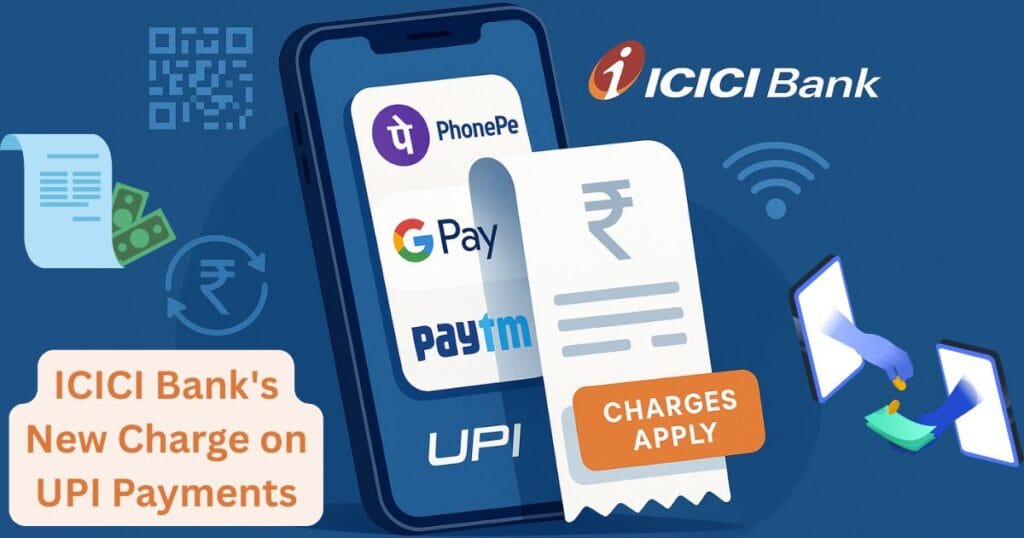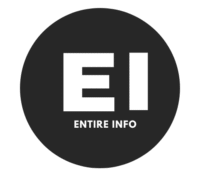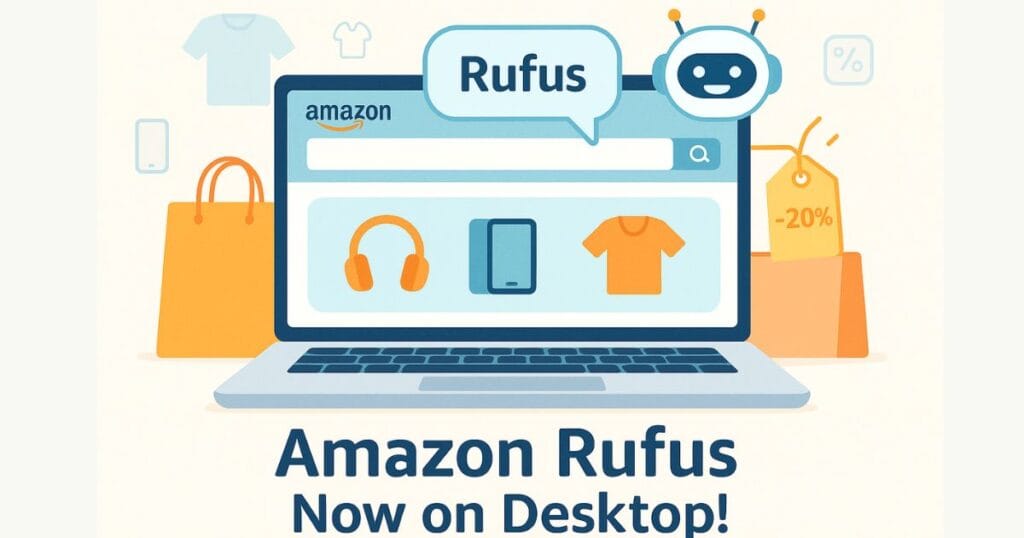ICICI Bank has recently made a big decision. Now it will apply some charges on UPI (payments done through apps like PhonePe, Google Pay). This rule will start from 1st August 2025. But the good news is that this charge will not be taken from common people like you, but from payment companies. Let’s understand the whole matter in simple words so that everything becomes clear to you.

Why is this charge being applied?
UPI has become a part of everyone’s life today. Whether buying things at a shop, sending money to a friend, or paying bills online—UPI has made everything easier. But managing so many payments is not easy for banks. A lot of money and effort goes into it.
- A large number of payments: Every month, billions of payments are happening via UPI. In June 2025, more than 18 billion payments took place, worth ₹24 lakh crore. Running such a big system is a huge task.
- Expensive technology: To keep UPI fast and secure, banks need big computers, software, and security systems. New technologies are also needed to protect against hackers.
- Cost of free service: UPI is free till now, but the cost is borne by banks and the government. Now banks say that to keep this system running, they also need to earn something.
ICICI Bank says that this charge is necessary to make UPI even better. Such a big system cannot run long without money.
When will this charge start?
This new rule will be implemented from 1st August 2025. So there are still a few months left, during which payment companies and banks can prepare for this change.
Who will have to pay the charge and how much?
This charge will have to be paid by companies that process UPI payments. These are called payment companies, like Google Pay, PhonePe, Paytm, or Razorpay. These companies deliver your payment to the shopkeeper. The charge will be like this:
| Type of Company | How Much Charge |
|---|---|
| Whose account is with ICICI Bank | 0.02% (maximum ₹6 per payment) |
| Whose account is not with ICICI Bank | 0.04% (maximum ₹10 per payment) |
Example: Suppose you make a ₹10,000 payment at a shop via Google Pay. If Google Pay has an account with ICICI Bank, then it will have to pay a charge of ₹2. If it doesn’t have an account, then ₹4.
Who will not have to pay the charge?
If you pay a shopkeeper directly into their ICICI Bank account using UPI, then no charge will be applied. That means shopkeepers who have an account with ICICI Bank and accept payments without any payment company will not have to pay this fee.
This will benefit shopkeepers. They might open an account with ICICI Bank, which will give the bank a chance to gather more deposits.
What impact will this have on you?
Now the question is, will you—the common person—have to pay this charge? No, you will not have to pay any fee. ICICI Bank has clearly said that this charge will be taken only from payment companies. If you send money to a friend or make a small payment at a shop, your cost will not increase.
But there’s one thing. Payment companies may collect this charge from shopkeepers. And to cover their costs, shopkeepers may slightly increase the price of some things. Like your coffee or online shopping items may become a little expensive. But this increase will be very minor, so you may not even notice it.
Which other banks are doing this?
ICICI Bank is not alone. Yes Bank and Axis Bank have also started charging payment companies on UPI. This shows that banks now want to share the costs of UPI. Soon, other banks may also start doing this.
Why is it so expensive to run UPI?
Running it is not as easy as it seems. There is a lot of work behind it:
- Millions and billions of payments: So many people use UPI daily that running the system without interruption is difficult.
- New technology: To keep UPI fast and secure, banks have to buy new software and machines every year. Special systems are needed to stop fraud.
- Cost of free service: It is free, but banks and the government are spending money on it. Last year, the government gave ₹1,500 crore to run UPI. But this cannot continue forever.
What impact will this have on payment companies?
This rule can be a bit difficult for payment companies:
- Increased cost: Paying fees on every payment will increase their expenses.
- Service prices may increase: Some companies may charge more from shopkeepers, making their services expensive.
- Loss to small companies: Big companies like Google Pay or PhonePe can manage these costs, but it may be difficult for smaller companies.
What are RBI and NPCI doing?
RBI (Reserve Bank of India): This is India’s largest bank that oversees the payment system. RBI has said that to improve UPI, banks are allowed to take some fees. RBI’s Governor has also said that keeping UPI free forever is difficult.
NPCI (National Payments Corporation of India): This is the institution that operates UPI. NPCI has allowed banks to collect fees from payment companies. Also, it is making new rules to make UPI easier and more secure.
What might happen next?
This decision by ICICI Bank could be just the beginning. In the future:
- More banks may charge fees: Big banks like HDFC, SBI may also start charging fees from payment companies.
- New rules: The government and RBI may create new rules for UPI. They might bring back the fee system known as MDR.
- UPI abroad: UPI is now available in countries like Singapore, UAE, and France. If the fee model works well, UPI may spread to more countries.
- Government’s stance: The government wants to keep UPI free, but it also understands that money is needed for it. So, it might come up with a new way in collaboration with banks and companies.
Read Official Modification in UPI Chargeback Rules from NPCI
What should you do?
For now, you don’t need to worry much. If you use UPI for small purchases or sending money to friends, your cost will not go up. But if you shop online more, you might see a slight change in prices.
If you are a shopkeeper, you can think about opening an account with ICICI Bank. This way you can avoid UPI fees. Also, keep an eye on new updates from RBI and NPCI.
ALSO READ- Biometric UPI Payments in India: Pay Using Fingerprint & Face
Conclusion
This new rule by ICICI Bank is an attempt to make it stronger. It has made our lives very easy, but running it costs a lot. That’s why banks are now charging some fees. This fee will be taken not from you, but from payment companies. Still, we’ll have to see how this change affects our lives.
Will regular users have to pay charges on UPI payments now?
No. ICICI Bank’s new charge will be taken only from payment companies (like PhonePe, Google Pay, Razorpay), not from regular users like you. So, if you’re sending money to a friend or paying at a shop, you won’t have to pay anything extra.
If I pay a shopkeeper who uses ICICI Bank, will there be any charge?
No. If you make a UPI payment directly to a shopkeeper’s ICICI Bank account (without going through a payment app), no charge will apply. The fee is only for payments that are processed through payment apps.
Could this make products more expensive?
Slightly, yes. Since payment companies will now have to pay charges to the bank, they might pass on that cost to shopkeepers, who in turn might slightly increase prices. So, things like coffee, online shopping, or mobile recharges might go up by ₹1–₹2, but the impact is expected to be minimal.


